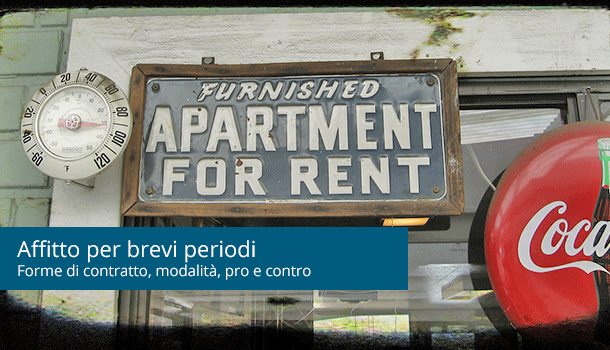Do you think it is difficult to find an apartment or room for for rent for short periods? On the contrary! Especially in recent times, whether for study-related or work-related reasons this is a rather common need! What’s more, there are different types of contracts suitable for regulating these “extraordinary” situations between landlords and itinerant tenants. If we talked earlier about how to optimize one’s search for short-term housing (e.g., in the article
short-term rental
), we will now turn to the regulatory part, starting with the basics: first of all, it is good to know that the law stipulates that any form of paid hospitality must be regulated by law and that it is necessary to register every paying guest, even if only for a few days. Rents that last less than eighteen months are considered “short-term” and for this very reason can be approached with different formulas than the standard lease agreement.
Short-term rentals, in fact, are exempt from the well-known Law 431/1998 regarding ordinary leases of residential properties; for these, it is therefore a certain flexibility: especially obligations, duties and payment terms are left to the discretion of the parties signing the contract. Essential, however, are the reasons for the stay; reasons for study, work transfers, health checks, or just sightseeing tours, for each of these there may be specific rules.
Let us now look at the most common cases of short-term rental: that for tourist purposes and that for transient (work or study) purposes.
Short-term rentals of a tourist nature
The main contract models that can be entered into between traveling roommates and non-professional landlords are two: the weekend contract, generally used for rentals of a few days, and the vacation home contract, used instead for somewhat longer periods of stay but still less than thirty days. In recent years, special portals specializing in the field have made their way onto the web: among them, special reference deserves AirBnb: a platform established in 2007, allows anyone who owns a space used for hospitality (which can range from a common sofa bed in the kitchen to a real guest room in residential apartments) to place their ad so that those looking for temporary accommodation can easily find what they need. The site offers several guarantees, both for the owner, who can reserve the right to refuse the reservation or accept it upon virtual presentation of a valid ID, and for the tourist-worker, who makes the payment, which, by the way, will be delivered to the owner only two days after the end of the stay. In addition to the living expenses required by the landlord, however, the tenant will also have to bear any costs for cleaning the accommodation.
Although this is a “smart” contract that can be adapted to different needs, it is important that, in addition to the length of the lease and the amount of rent, all specific requests from the landlord are included, particularly those concerning any incidental expenses and the
security deposit
. Neither of these two types of contracts, however, has any special stamp or tax obligations, unless the renter is practicing this as a professional activity.
Short-term rentals of a transitory nature
For stays longer than thirty days, on the other hand, there is the non-tourist short-term rental formula, and it is necessary to enter into (and register with stamp and registered mail) a proper contract, called a temporary lease contract o transient contract. Again, the parties agree independently (except in cities with high housing tension, where an agreed rent applies instead) the amount of the rent and security deposit. The landlord is obliged to declare, in addition to the reason for renting, the presence of the person renting to the local authority. The registration mode can also be used for this type of contract with
dry coupon
so as to have access to a preferential taxation system.
But beware! Knowing who is entering the home and why is important for multiple reasons, and not necessarily strictly related to the relationship between landlord and tenant. The latter, in particular, should keep in mind that. subletting, as a rule, is prohibited, although there is nothing to prevent agreeing with the landlord on the presence of a temporary substitute (but in case of damage caused to the room and/or the property, the sublessor remains the directly responsible, with all the consequences that come with it). On the other hand, in case the landlord omits to indicate the specific temporary need, the transitional contract is not considered valid and is subject to the standard rules of rent-free contracts (4 years + 4 years). The same thing happens in the case of renewing a transitional contract that has already been concluded and whose term has expired: the renewed contract will automatically fall under the type of standard ones.
Bottom line: regardless of whether you are a sheepdog or a migratory bird, your lifestyle and your motivations for moving from one place to another, don’t forget to find the contract solution that best suits you and your needs!
Ti potrebbe interessare anche:

Pubblicato il 19-05-2023 11:05:53

Pubblicato il 13-05-2023 15:34:33
Pubblicato il 09-05-2023 14:39:52

Pubblicato il 09-01-2023 11:45:02

Pubblicato il
